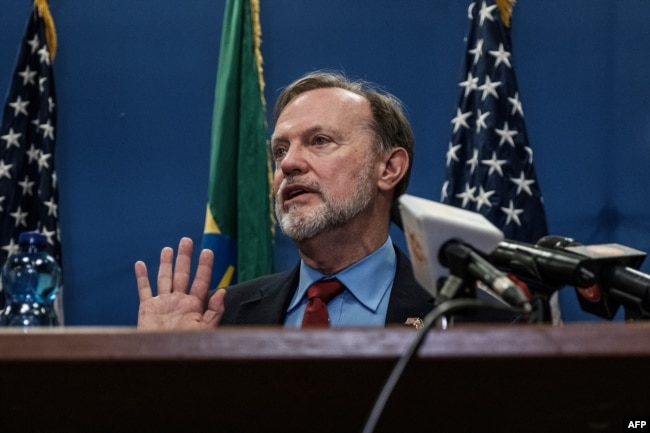 |
| Partial view of burnt Beauty Salon in Buea owned by Mr. Mboe Ekoko |
By Acha Smart
The Anglophone Crisis,
which erupted in 2016, has not only
resulted in the deaths of over 2000 people, but
over 200 villages have reportedly been burnt down and property worth hundreds of
billions of Fcfa destroyed in the two English-speaking
regions of Cameroon, leaving their owners in desperation.
But who is actually
burning public and private propriety?
It has become a blame game
between the separatists and Cameroon regular forces whenever some propriety-whether
state-owned or private is burnt down, as both protagonists trade accusations
and counter accusations.
It would be recalled that, on 11 February
2019, the state-owned Kumba General Hospital was burnt down reportedly by the
military that are said to have accused the health facility of treating wounded
separatist fighters but the military blamed the separatists for the arson.
Cases of burnt propriety
are more common during ghost towns called by separatists or during military
raids on neighborhoods suspected to be hide-outs for separatists.
Separatists fighting for
an independent state for Anglophones have reportedly burnt down enormous
propriety in towns like Buea, Muea,Ekona,Kumbo Muyuka ,Kumba and Bamenda as crude method of enforcing the respect of civil disobedience by citizens.
As the Anglophone crisis
deepened, Cameroon government in 2017 outlawed Southern Cameroons National
Council, (SCNC), which was created in 1994 to ensure the independence of
Southern Cameroons, a former UN British trust territory, which gained
independence on October 1, 1961 by joining La Republique of Cameroun, a former
French colony.
The former Minister of Territorial
Administration, René Sadi, had noted in his January 17, 2017 banning order:
“Southern Cameroons
National Council (SCNC) and the Cameroon Anglophone Civil Society Consortium
(CACSC) are declared null and void for their purpose and activities, which are
contrary to the Constitution and liable to jeopardize the security of the
state, territorial integrity, national unity and national integration,”
The ban of the separatist
movement and the arrest of Barrister Agbor Balla and co, who called for and
coordinated wide-spread civil disobedience, rather radicalized activists across
Anglophone Cameroon.
According to recent
reports, on March 20, 2019, a young Bafaw businessman, William Mboe Ekoko,born on
10th June 1990,in Kumba Town got
his beauty salon burnt down in Great
Soppo Buea allegedly by separatists who had tagged him a blackleg for publicly condemning
their activities. The saloon was burnt after three unidentified men, believed
to be SCNC activists, had stormed the Buea family residence of Ekoko looking for him in vain.
Mboe Ekoko was said to have
gone into hiding after his car was burnt on February 18, 2019 where it was
parked and he continued receiving anonymous death threats.
The crisis has forced
Anglophone activists as well as the other victims of crisis to flee the country
More than 40 thousand
Cameroonians have fled the crisis, in search of
asylum in Nigeria.
Radical Anglophone activists,
described by Cameroon Government as secessionists are based in the USA, South
Africa and Europe where they have been faulting
the Biya regime for failing to quickly
resolve the Anglophone crisis, which is an urgent request for the granting of Anglophone minority rights.
Anglophones claimed their rights
have been trampled upon by the majority French-speakers of Cameroon, who have
produced the two presidents the country has had. The minority English-speaking regions
were formerly UN-trust territory, called Southern Cameroons and administered by
Britain.
Southern Cameroons later gained independence
on October 1, 1961 by joining La Republique du Cameroun, which had on January 1,
1960 been granted independence by
France.
Since both entities became
one, Anglophones have been complaining of marginalization and discrimination
against them by the majority French speakers.
The Crisis actually sparked
off in 2016 when lawyers and Anglophone teachers protested against the imposition
of French-speaking workers in schools and law courts in the two
English-speaking Regions of Cameroon.
Rights groups report that over half a million
people are internally displaced, with many women and children hiding in bushes
under deplorable conditions, as separatists and Government forces continue to engage in deadly clashes.
Families
not only complain of the disappearance of loved ones, but molestations, torture,
kidnappings, arrests and detention have marked the crisis.
Cameroon accuses the
Diaspora citizens especially in the USA and Europe of
bankrolling separatist fighters seeking the independence of minority-speaking Anglophones.
It has also accused them of using the social media to mobilize protests against
President Biya, 87, who assumed office in 1982.
The Biya government has
maintained that Cameroon is one and indivisible, a stance that separatists
challenge.




